
Cockney Rhyming Slang
First published: Sunday June 11th, 2023
Report this blog
What is Cockney Rhyming Slang ?
This strange, weird, almost comical language replaces words with other words that rhyme. It is quite difficult to explain, so maybe a few examples will help.
In the blog title's thumbnail is a picture of some "apples and pears", this is slang for "Stairs".
You may have noticed that instead of just rhyming the word pears, the phrase is apples and pears. Every word that is substituted with the rhyme has two or three words to replace it.
For example...
Frog and Toad = Road
Jam Jar = Car
Dog and Bone = Phone
From just these three, we can make the sentence "Don't use your phone when driving your car down the road" which translates to "Don't use your dog and bone when driving your jam jar down the frog and toad" which to the uninitiated sounds like nonsense. However over the years some of the more popular phrases have been shortened to just the first word. So "dog and bone" becomes just dog. So someone may say "Pass me the dog please". Again, nonsense unless you know.
If you, dear reader, are still confused, the rest of the blog will either help or not. Hopefully it will help.
Where did it originate and why?
Cockney Rhyming Slang as you can probably guess, originates with the Cockney population.
Firstly, we must examine what a "Cockney" is. A true Cockney, for there are many imposters, was born in the East End of London within the sound of Bow Bells. Bow Bells are rung at the church of St Mary le Bow in Cheapside, one of London's oldest thoroughfares.
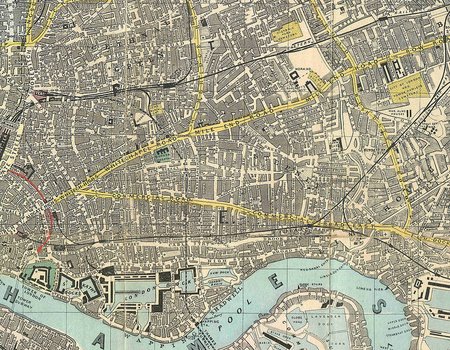
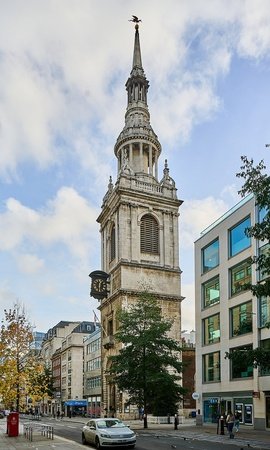
So a Cockney is typically born in the East End of London, although depending on the wind direction the bells can be heard in different parts of the capital.
So, the dialect originated in the East End and there are some differing theories of why it became to be. It is thought to have started in the early to mid 19th century. The first mention of it in any literature is in 1859, in John Hotten's dictionary, where it suggests the slang started around 15 or so years ago in about 1840. Although, there was probably some form of the dialect a little earlier.
Back then the East End wasn't the highly developed parish it is now. The East End was a dangerous place, being near to the docks there were immigrants of almost every nationality bedded down, criminal activities were rife, prostitutes plied their age old trade, and the residents were amongst the poorest in the city. As an example, Jack the Ripper is famous for killing his victims in the Whitechapel area of the East End. There was little, or no, police force, as the Metropolitan Police were only formed 10 years before in 1829.
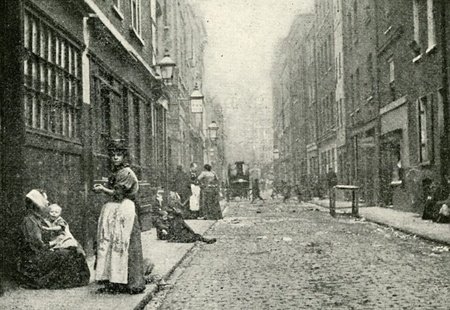
Another theory is that the words were used by Irish immigrants for similar reasons.
What are the origins of the rhymes?
The rhyming part of the dialect originates from many different sources. Some are just random rhyming words, whereas others mention specific people or locations or even in some cases events.
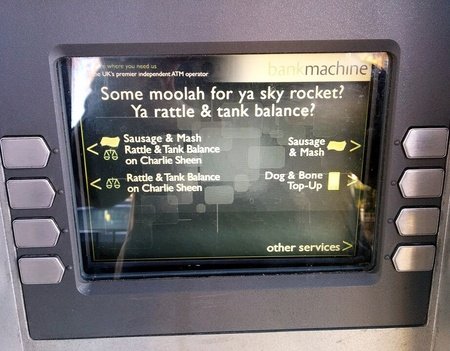
the ATM screen translates to ....
(at the top) Some Money for your Pocket? Your Bank balance?
(On left) Cash, Bank Balance on screen / Bank Balance on Screen
(On right) Cash / Phone Top-Up
People in rhymes
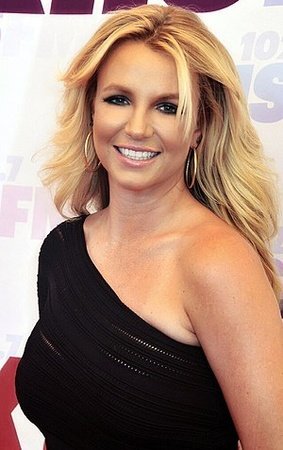

The above two people are examples of more modern developments in the dialect. The names will be shortened in conversation as mentioned earlier, so the sentences might be "Dya fancy going out for a few Britneys?" or "That tom's a bit Meryl" . The last sentence uses one of the few rhymes that use just a single word "tom" that is an abbreviation of the full rhyming word of "tomfoolery" that means jewellery.
Some of the older phrases contain references that are now pretty obscure. For example, the way to say "Shall we go for a curry" would be "Fancy a Ruby" the name Ruby originates from a Northern Irish singer, Ruby Murray, that was popular in the 1950's, about the same time as Indian restaurants started to be popular in London.
Mickey Mouse is the phrase used for Scouse, a person from Liverpool commonly known as a Scouser hence the phrase used is usually a Mickey Mouser. There is also a derogatory use suggesting that Mickey Mouse means counterfeit, this is thought to derive from the often misguided thoughts that people from Liverpool are criminals.
Some examples of other names ...
Gregory Peck (actor) - neck or cheque
Alan Whickers (travel TV journalist) - Knickers
Nat King Cole (singer) - dole (meaning unemployment benefit derived from the former Department of Labour and Employment)
Kurt Cobain (singer) - cocaine
Locations in Rhymes
As well as people, often used rhymes developed from areas around London in general.
Peckham Rye, is a parkland area that was used as a POW camp during the Second World War. Its name is used to rhyme with tie or as it used to be called, necktie.
Similarly, Hampstead Heath, another parkland area, is said to denote "teeth" .
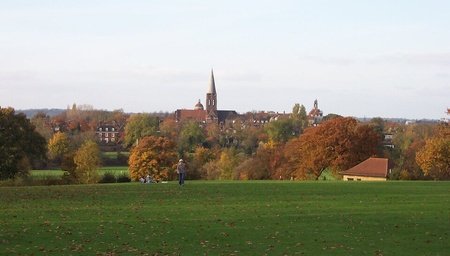
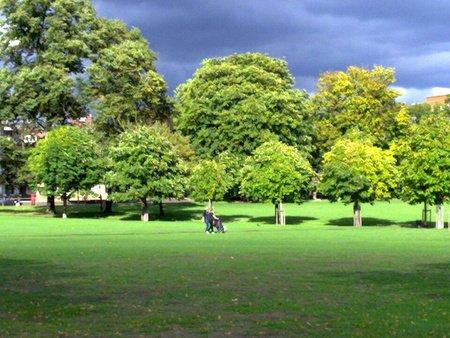
Some of the slang relies on also knowing the accent of the East End, or in fact of London and the South East of England too. Some words are drawn out slightly, so for example, the word "cross" is pronounced crorse. This is why the place name Charing Cross became associated with horse.
In a similar vein the "Khyber Pass" came to be used to represent "arse", although it does rhyme with the oft used stateside word of "ass". All my US based readers can now use the word "Khyber", for example "Don't talk to him, he's a real Khyber" see how many others understand you !
Oh, by the way, during WW2 there were lots of American Forces in the UK, these were known as Yanks locally, (Over Paid, Over Sexed, and Over Here was a common description at the time) in London they were known as "Septics" rhymes with septic tank, a underground collection vessel for toilet waste that has to be emptied regularly. Make of that what you will.
Examples that are now in mainstream use
Some of the phrases have not just slipped into common usage, but positively slammed into it. Whether the fact that every household has a TV nowadays is the cause, who knows, but it is probably likely. Especially with the popularity of a BBC soap called EastEnders and the comedy series Only Fools And Horses with their usage of some terms. If you live in the UK and several other countries you will know both of these, I'm not sure about the US or Canada, let me know.
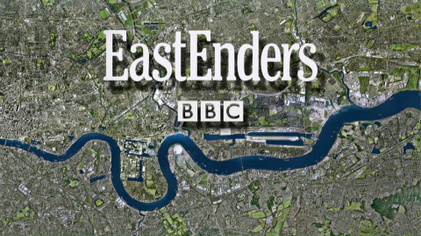
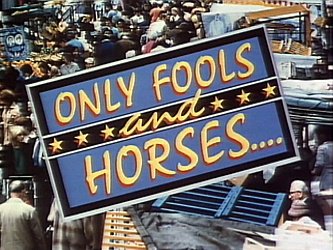
Here's a few examples, I'll add the actual translation below them.
Scooby Doo features with the phrase "I haven't got a Scooby"
Others are...
"Use your loaf"
"Can I have a butcher's"
"It's all gone Pete Tong"
"Blowing a raspberry"
Any of you guessed the words yet ? No? Well here's the answers...
Scooby Doo = Clue
Loaf (of Bread) = Head
Butcher's (Hook) = Look
Pete Tong = Wrong (Pete Tong is a famous radio and club DJ)
Raspberry Tart = Fart
There are others but frankly some of them are definitely NSFW and super offensive. For example, now, I'll have to be careful here and I won't be publishing the actual word, you'll have to work that out for yourselves. (I don't want to get banned...sorry)
If someone is being a bit of an idiot they are often called a "berk". The word berk in itself isn't offensive, however it derives from Berkeley Hunt (a popular event many years ago that was to do with fox hunting, now banned in the UK). So, as you probably guessed by now, the Hunt part of the phrase is the rhyming bit. The actual word has different meanings around the world, in the UK it is an unpleasant or offensive man as well as it's original biological meaning. (I think that's enough of that)
In TV and Film
I've already mentioned EastEnders and Only Fools but there are many that have rhyming slang dialogue. The 70's UK police drama "The Sweeney" is set around the Metropolitan Police Flying Squad (a rapid response detective unit). In fact the actual title of the series comes from the slang name "Sweeney Todd" = Flying Squad.
Other TV series were Steptoe and Son(about London scrap men), Minder (about a small time criminal and his sidekick), and Mind Your Language (about a school for immigrants to learn English).
Films that have featured the slang include...
The Italian Job (1969, starring Michael Caine) a crime caper about a heist in Turin. The final part of the movie features a song, ("Getta Bloomin' Move On" a.k.a. "The Self Preservation Society") that has many rhyming slang lines in it.
Lock, Stock, and Two Smoking Barrels (1998, featuring Jason Statham in his first feature film role) a comedy crime film.
Ocean's 11 (2001 starring George Clooney) another crime caper film (there seems to be a trend here)
Austin Powers in GoldMember (2002 starring Mike Myers) a comedy spoof of the James Bond franchise.
International Variations
There is a small usage in other parts of the world, mostly Commonwealth countries that were initially part of the British Empire. I suppose emigrants from the UK took phrases with them and they were passed onto the local populace.
The most used example is in Australia where the term "pommy" is used for the English, sometimes in a derogative fashion but I believe mostly in an affectionate way.
It is thought that "Pommy" derives from the word pomegranate, which was changed into "Pommy Grant" to rhyme with immigrant. The thought that it derives from Prisoner Of Her Majesty is now generally thought to be false.
Conclusion
That's about it really, a short blog about a dialect or language that is little known outside of certain quarters. Many of the rhymes a not known at all outside of London, whereas others are used in normal conversation throughout the United Kingdom and beyond.
Anyway, I thought I'd try a little challenge for you. So it's......
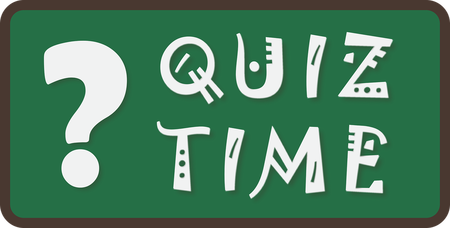
I'll give you a short paragraph using some rhyming slang and you can try and decipher it. Put your answers in the comments. I'll leave it a few days and then put a sticky comment with the answer.
Here's the paragraph....
"Ayup me old China, how's yer loaf?, That was a good night in the Rub with you and your Trouble! We had a few too many Britneys but when you set your Mincers on that Septic with the Syrup, we didnt half have a Turkish!"
GOOD LUCK !

Translated it means....
"Hello mate, how is your head? That was a good night in the pub with you and your wife! We had a few too many beers but when you set eyes on that Yank with the wig, we had a good old laugh"
Cockney Words...
China (China plate) = mate
Rub (Rub a dub dub / Rubbity dub) = Pub
Trouble (Trouble and Strife) = wife
Britneys (Britney Spears) = beers
Mincers (Mince Pies) = eyes
Septic (septic tank) = Yank
Syrup (Syrup of Figs) = Wigs
Turkish (Turkish Bath) = Laugh
"Hello, mate. How's your head? That was a good night in the pub with you and your wife. We had a few too many beers but when you set your eyes on that Yank (American) with the wig, we had a pretty good time."
You already mentioned loaf, Britney and septic. China plate gives away mate and rub gives pub (I know Brits love going to the pub). For trouble and syrup I had to look up online. Mince pies gave away eyes and Turkish bath gives laugh because Cockney speakers pronounce th as f (thanks YouTube). I didn't understand the "didn't half have" part though.
Again, as always, a very interesting blog! :)
You are pretty much spot on with the translation.
"Didn't half have" is an expression that sort of means "really good" or "the whole of" if you like. It's typical of British understatement and sarcasm.
Unlike the "septics" we tend to be more reserved with our emotions. If you ask someone after an amazing win at football(soccer) they will sometimes say "Yeah we did Ok" rather than whooping and hollering and shouting it from the treetops. This reservedness does tend to fade away proportionately to the amount of beer consumed.
Ah interesting, I find these cultural nuances very fascinating!